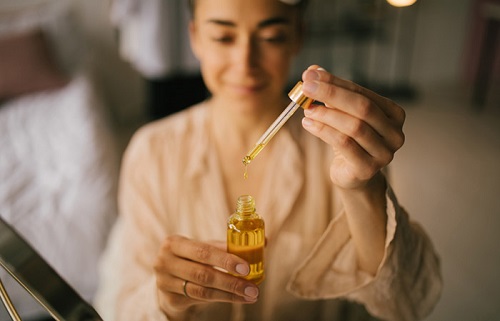Can You Use Jojoba Oil As Lube? Here’s an in-depth analysis to explore the safety, benefits, and considerations for its sexual use!
The quest for the perfect personal lubricant often brings us face-to-face with various options, from water-based commercial products to more natural alternatives. One such alternative that has piqued interest is jojoba oil. Known for its skin-friendly properties, it is commonly found in skincare products. But Can You Use Jojoba Oil As Lube? Let’s dive in to find out.
Learn about Using Castor Oil as Lube here
Understanding Jojoba Oil
Hailing from the arid landscapes of the southwestern United States and northern Mexico, the jojoba plant is a natural wonder. The oil extracted from its seeds stands out for its unique chemical structure, which closely mimics the sebum—natural oil produced by human skin.
This remarkable resemblance equips jojoba oil with superior moisturizing properties, making it a sought-after ingredient in a wide array of skincare and hair care formulations.
Have a look at the Benefits of Castor Oil for Toothache here
Can You Use Jojoba Oil As Lube?
Using Jojoba Oil as Lube stems from its skin-friendly qualities and long-lasting lubrication, making it a compelling natural alternative for intimate use. However, here are key considerations to weigh before incorporating it into your intimate routine:
1. Hypoallergenic Properties
Jojoba oil is hypoallergenic, which means it has a lower likelihood of causing skin irritations or allergic reactions. However, perform a patch test before incorporating it into your intimate routine.
2. pH Level Compatibility
Jojoba oil’s pH level is remarkably close to that of human skin, making it less likely to disrupt your body’s natural pH balance. This is crucial for reducing the risk of bacterial infections.
3. Condom Compatibility
Oil-based substances, including jojoba oil, are not compatible with latex condoms. Using them together can weaken the latex, increasing the risk of breakage. If you plan to use jojoba oil as lube, opt for polyurethane or nitrile condoms instead.
4. Long-lasting Lubrication
Due to its waxy nature, jojoba oil offers long-lasting lubrication compared to water-based alternatives, providing a more sustained experience.
5. Vaginal Health
Being non-comedogenic, jojoba oil doesn’t clog pores, which minimizes the chances of bacterial buildup and potential infections in the vaginal area.
Learn about Using Jojoba Oil for Nails here
Considerations and Best Practices
To ensure that your experience with jojoba oil as a lubricant is not only safe but also enjoyable, it is essential to adhere to the following best practices:
1. Patch Test
A patch test is a simple yet invaluable precautionary measure. Before using jojoba oil as a lubricant in your sexual course, apply a small amount to a sensitive skin area. This preliminary assessment helps identify any adverse reactions or irritation, allowing you to proceed with confidence.
2. Non-Latex Condoms
If you choose to use jojoba oil as a lubricant and rely on condoms for protection, it is crucial to opt for non-latex condoms. These condoms are made from materials such as polyurethane or polyisoprene, ensuring compatibility with oil-based lubricants.
3. Appropriate Amount
When applying jojoba oil as a lubricant, moderation is key. Using a moderate amount ensures that you experience the benefits of reduced friction without creating an excess of oil residue that could lead to discomfort.
4. Clean-Up
After using jojoba oil as a lube, gently wash the genital area to remove any residual jojoba oil. This practice helps prevent potential irritation and maintains personal hygiene.
Learn about the Smell and Texture of Castor Oil here
Conclusion
Jojoba oil, with its natural moisturizing properties and long-lasting lubrication capabilities, presents itself as a promising option for use as a lubricant during intimate moments. While it offers several advantages, including enhanced comfort and hydration, it is crucial to be aware of its compatibility with condoms and the potential for individual sensitivities.
By prioritizing safety through patch testing and selecting appropriate condom materials, you can explore the benefits of jojoba oil in your intimate experiences.
FAQs
1. Is Jojoba Oil Safe To Use As A Lubricant During Intimate Moments?
Jojoba oil is generally considered safe for use as a lubricant for most individuals. It’s hypoallergenic and well-tolerated by many. However, it’s essential to perform a patch test to check for any adverse reactions before using it extensively.
2. Can I Use Jojoba Oil With Latex Condoms?
No, jojoba oil is an oil-based lubricant and is not compatible with latex condoms. It can weaken the latex, potentially leading to condom breakage. For safe intercourse with latex condoms, it’s recommended to choose a water-based lubricant.
3. How Do I Perform A Patch Test With Jojoba Oil?
To perform a patch test, apply a small amount of jojoba oil to a sensitive area of skin, such as the inner forearm. Leave it on for about 24 hours and monitor for any signs of irritation, redness, or itching. If no adverse reactions occur, it’s likely safe for you to use.
4. Is Jojoba Oil Suitable For Individuals With Sensitive Skin or Allergies?
Jojoba oil is often well-suited for individuals with sensitive skin due to its hypoallergenic properties. However, individual sensitivities can vary. If you have known allergies or sensitivities, it’s best to consult with a healthcare provider before using it as a lubricant.
5. How Much Jojoba Oil Should I Use As A Lubricant, And How Do I Apply It?
Start with a moderate amount of jojoba oil and apply it directly to the area where lubrication is desired. It’s advisable to start with a small amount and add more as needed to avoid excess. Remember that a little goes a long way.
6. What Should I Do If I Experience Discomfort or Irritation During or After Using Jojoba Oil As A Lubricant?
If you experience discomfort or irritation, discontinue use immediately. Gently wash the affected area with mild soap and water. If symptoms persist or worsen, consult a healthcare provider for guidance and potential treatment.




